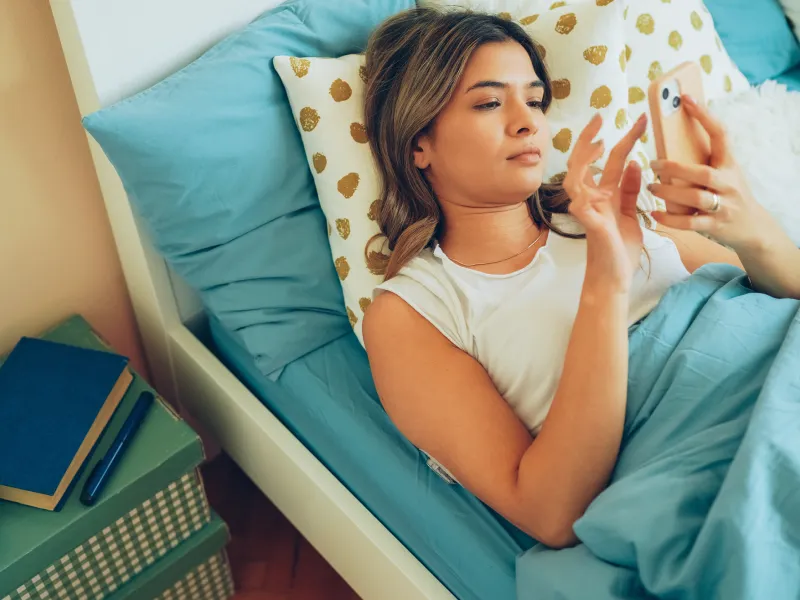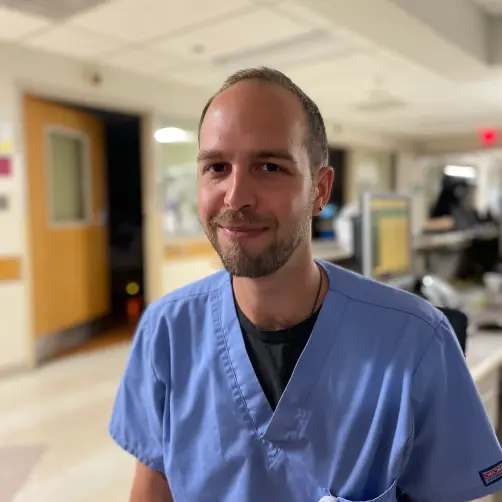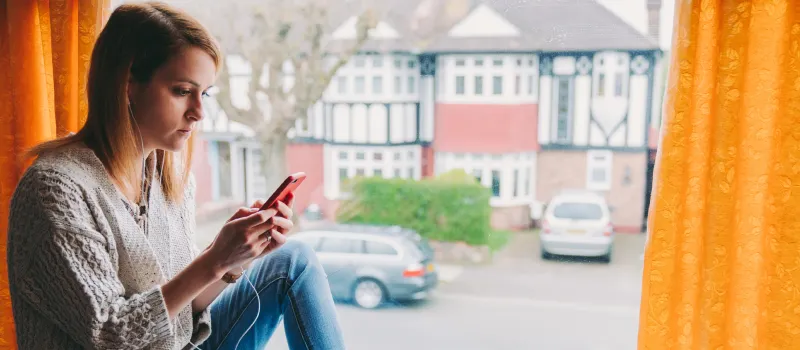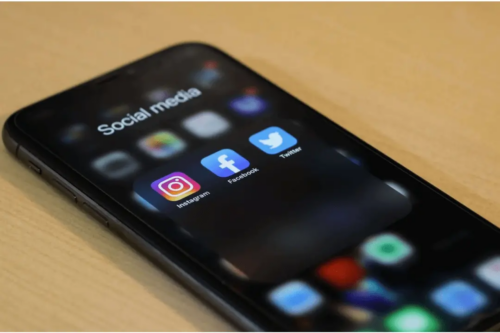
Table of Contents
The Dangers of Self-Diagnosing

Written By: Ethan Cohen BSN, RN
Updated: July 24, 2023
8 min.
Teens are increasingly diagnosing themselves with serious mental health issues based on social media content alone.
Learn more about our Clinical Review Process
Table of Contents
Mental health and wellness content on social media platforms is leading young adults to self-diagnose psychiatric disorders without the guidance of trained professionals. This article explores the phenomenon and highlights the inherent dangers of self-diagnosis.
What is self-diagnosis?
Self-diagnosis occurs when an individual identifies a medical condition affecting themselves. This can be done by studying medical libraries, internet research, or examining personal experiences. Due to a lack of accuracy, external influences, and biases, self-diagnosis can be very dangerous and unsafe.

Hope and healing are closer than you think.
Learn if our virtual intensive outpatient program is right for you today.
Self-diagnosis vs. clinical diagnosis
The American Psychological Association (APA) defines diagnosis as “the process of identifying and determining the nature of a disease or disorder by its signs and symptoms, through the use of assessment techniques (e.g., tests and examinations) and other available evidence.” The language in this definition lends insights into the complicated nature of self-diagnosis. In the sciences, there is generally an emphasis on tests and examinations. Professionals use these evidence-based tools to better understand the patient’s situation and to accurately assess and diagnose mental health conditions. Appropriately using and applying these assessment tools takes many years of training. In many cases of self-diagnosis, people arrive at a diagnosis based on very little evidence and have not used the tools and assessment techniques necessary to be able to diagnose. In other words, the idea of “self-diagnosis” is actually a misnomer.
People looking for answers to their mental health questions on the internet may be able to apply psychiatric labels to their experiences, but without a formal examination by a mental health professional, self-diagnosis can be a very slippery slope. The journey towards receiving a legitimate, evidence-based diagnosis is one of mutual contribution. When an individual seeking mental health services comes to a licensed professional with an honest account of their personal history and symptomatology and allows for an open dialogue surrounding the nature of their concern, the likelihood of a proper diagnosis is much higher.
The Gen-Z mental health crisis
Over the past several years, mental health and wellness has become a central subject in the news and on social media. This makes sense considering the APA’s report in 2020 that warned that the United States is currently in the midst of a national mental health crisis, with Gen Z teens (ages 13 to 17) and Gen Z adults (ages 18 to 23) bearing much of the burden of this stark new reality. The effects of the COVID-19 pandemic, mass shootings, climate change, and an overwhelming sense of uncertainty about the future have sent teens and young adults looking for answers. They want to know how to feel better. They want to feel safe. They want to know if how they feel is normal, and they are turning to the internet for the answers to their questions.
According to the American Academy of Child and Adolescent Psychiatry, children ages 8 to 12 spend an average of 4 to 6 hours a day watching or using screens. For teens, the amount of screen time is closer to 9 hours a day. Teens and young adults are growing up on the internet, and are using their smartphones and social media applications to explore ideas surrounding mental health, a topic that has become a pertinent issue for their generation. This, however, begs the question: are they looking for answers in the right places?
Mental health content on social media
There has been a recent rise in the popularity of user-generated content surrounding the topic of mental health on social media platforms such as TikTok and Instagram. For example, in 2021, content on TikTok that included the hashtag ‘ADHD’ had 2.7 billion views, 2.5 billion views for content with the hashtag ‘Tourettes,’ and 1.5 billion views for content with the hashtag ‘DID.’
Often, user-generated content comes in the form of personal experience videos wherein creators share their experience living with a mental health condition, explain their symptomatology, and share with the viewer how they deal with their condition on a day-to-day basis. According to a recent study, of the 100 most popular ADHD-tagged videos on TikTok, personal experience videos were the most popular, with an average of 3.9 million views each. Critically, this study also found that over half of the videos on TikTok about ADHD were medically ‘misleading’ and warned healthcare professionals to be “aware of the widespread dissemination of health misinformation on social media platforms and its potential impact on clinical care.”
The rise of self-diagnosis
Clinicians in both the United States and abroad have seen an increasing number of individuals requesting mental health consultations, reportedly due to information they obtained on social media and the internet about mental health. Meaghan Warner, LCSW, In an article for McGovern Medical School, Meaghan Warner, LCSW, explains, “It’s easy to get lost in a Google hole and start relating with every symptom you see, which can cause increased anxiety. The growing anxiety could be covering something else that may be going on.” Warner points out that the information being shared on social media can come from anyone, namely including. people without any medical or mental health training. Simply put, just because it’s on TikTok or Instagram doesn’t mean it is true.
In the aforementioned study about social media content on TikTok about ADHD, only 21% of the content reviewed was considered ‘helpful information’ by clinical experts. Warner goes on to explain that while some of the content found on social media can help people acknowledge a mental health problem or the need to seek professional help, danger arises when these people choose to self-diagnose and begin an attempt to treat themselves without the guidance of a trained mental health professional.

The negative effects of self-diagnosing a mental illness
When self-diagnosis is incorrect, proper care and treatment can be delayed, leading to very serious consequences. A type of confirmation bias can oftentimes exacerbate this delay in care. For example, consider a situation in which an individual identifies with a personal experience video on TikTok about dissociative amnesia. This information could create a self-fulfilling prophecy wherein the person begins to identify episodes of normal forgetfulness with this specific pathology when in fact, they do not meet the diagnostic criteria for dissociative amnesia. They may pursue treatment modalities without the guidance of a trained professional for a disorder they do not have.
According to Tristan Collazo, a licensed resident in counseling at Wholehearted Counseling in Virginia Beach and Carrollton, Virginia, “Someone develops certain negative or harmful side effects or symptoms because they believe or expect that they will occur. In other words, a social media post saying that people with these particular symptoms have a particular disorder could cause someone to feel that they do, in fact, have the disorder or cause them to engage in behaviors that confirm it.” Furthermore, clinicians have described scenarios in which patients are reluctant to move forward with a particular therapist if the therapist does not agree with their own self-diagnosis. This can further delay care for someone that may be in need.
Mental health diagnoses are nuanced and complex. It takes a licensed professional to be able to diagnose them properly. In the scenario above, a licensed professional would be able to discern whether or not the individual was experiencing normal, temporary episodes of forgetfulness or whether it would be necessary to do further screening and diagnostic tests to confirm an accurate diagnosis. As mentioned in the previous section, some disorders share symptomatology and can easily be mistaken for one another. For example, mood swings can be present in bipolar disorder but can also be found in borderline personality disorder. A parent may self-diagnose their child with ADHD when in fact the child has sensory processing disorder, or maybe the child is experiencing a nonpathological delay in their development. It is also important to consider the possibility of a dual diagnosis, which is often overlooked by the untrained person trying to self-diagnose.
Do you need more support with
your mental health?
Charlie Health can help.
One of the most negative effects of self-diagnosis is the possibility of missing a serious medical disorder disguised as a mental or behavioral health issue. Certain endocrine, neurologic, and cardiac disorders can present similarly to major depressive disorder, generalized anxiety disorder, and many other mental health diagnoses. While a person may assume that they are suffering from depression, they could be experiencing symptoms related to hypothyroidism or a certain vitamin deficiency.
Why you should seek a clinical diagnosis
The stigma surrounding mental health and wellness has lessened over the last several years and more information and support is being provided on user-generated content sites like TikTok and Instagram for people dealing with mental health issues. However, it is important to remember that if your mental health is beginning to harm your day-to-day life, it is best to consult a licensed professional. Researching what may be going on with you can be helpful if it is done in the right way, but more often than not, if you have found yourself in a situation in which you believe yourself to have a diagnosable mental health disorder, reaching out for help from the right source is imperative.
How Charlie Health can support your mental health journey
If you think you are struggling with a mental health condition, Charlie Health can help people receive evidence-backed, professional mental healthcare. Once you reach out to Charlie Health and connect with our Admissions Team, you will be immediately matched with a personalized care plan.
According to an article in The Washington Post, the national mental health crisis has caused huge delays in people’s ability to receive mental health services, with many waiting for months to finally speak with a clinician. As discussed, teens and young adults are increasingly using easy-to-find resources such as social media platforms to explore their relationship with mental health and wellness during these uncertain times, but the unfortunate reality is that the quality of the information they are receiving is often inaccurate.
With the help of our trained professionals at Charlie Health, people seeking mental health services can expect prompt, well-informed, and personally tailored care from a trusted source. Fill out this form to Get started today.




